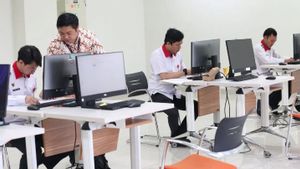JAKARTA - The rapid development of digital technology must be anticipated better, faster, and swiftly. Thus, Indonesia can take the greatest benefit from the current changes to the prosperity of all people.
This is the message of the late economist Prof. Dr. Sri Adiningsih, MSc in his book 'Digital-Based Economic Transformation in Indonesia'.
It is undeniable, since the fourth industrial revolution rolled out in 2012 which was marked by a cyber system or a digital revolution, the world has experienced disruption.
For example, in the business world, various digital innovations that arise make business patterns change completely. Not a few businesses face difficulties, even die from being victims of change. Travel agents have begun to be abandoned, people prefer to buy airplane tickets through online applications because they are faster and more effective.
Conventional banks that do not change their services will lose competitive with financial technology (Fintech). People can take loans through fintech P2P lending with much easier and faster requirements.
Likewise, conventional expedition service companies that can be less competitive with delivery startups or shipping services that have implemented technology drone/disruptive technology.
Currently, the big name of the company is not a guarantee of success. What determines is the agility and speed of transformation. Look at the appearance of Gojek that threatens big names such as Bluebird, Damri, and other taxi companies. Prioritizing consumer convenience and comfort is an important point.
"That is proof that the fast-transforming will prey on the slow, not the big prey on the small," Sri said.
Likewise in the world of health. A number of technological innovations such as online and mobile health applications, 3D printing, artificial intelligence (AI), electronic health, and mobile health that involve cellphones have influenced daily health professional work.
As a result, the need for hospitalization in the future can be even more lost because the treatment ward is only used as a place for diagnosis and temporary treatment rooms. For diagnosis purposes, only one tool is needed to determine the overall human condition.
In addition, specialist doctors no longer use surgical knives because robots will spread to the intended organs. The PLA General Hospital of the People's Republic of China in collaboration with technology company Huawei has even been able to carry out operations using Huawei's 5G technology. The operation was carried out for three hours with doctors 3,000 km in Beijing.
Researchers from MIT, Draper, and Brigham and Women's Hospital are also developing capsules with 3D printing technology that can be inserted into the body. By using conesibultooth, health can be monitored via smartphone.
"It's great again, capsules can be arranged according to the drug dose and can be designed to feel infections, allergic reactions, or other reactions, and then release drugs in response," Sri said.
The world of education has also been affected. Access to unlimited information allows everyone to learn various things easily. The pattern of learning inevitably has to be adjusted.
The International Labor Organization (ILO) in a report entitled 'ASEAN in Transformation: The Future of Jobs at Risk of Automation' in 2016 estimates that around 56 percent of the total work in Indonesia has a high risk of being replaced by robots.
The industrial sectors that have a high capacity to be replaced with automation are hotels and restaurants, trade and retail, construction, and manufacturing.
Indeed, a lot of work will be lost, but McKinsey's study says many new jobs will emerge, even the numbers could double what was lost.
The increasing use of smart products, intelligent assistants, and robots will fundamentally change the skills and jobs needed in the future. When machines become smarter, humans will play a new role to focus on creativity and collaboration in solving problems. Thus, more types of work situations can be worked on.
That is why the development of Human Resources (HR) has become a mandatory matter. In the future, students must be prepared to hone skills, creativity, collaboration, and problem solving.
Schools must teach computer science as a core curriculum of all lessons. Not having to learn coding, but also being able to learn computation, data analysis, machine and network learning, as well as cyber and robotics.
Humans with high cognitive skills, such as having creativity, critical thinking, and ability to make decisions will be increasingly in demand in the work structure because they can reduce automation.
With the emergence of new technologies and ways of working, the public or workers must become more creative in order to benefit from technological advances. Automation and robotics can help achieve the growth and prosperity of a country, but they cannot be creative to humans.
The combination of humans and machines will be an important element in producing higher productivity and a more dynamic and interesting human work experience.
The most important challenge is to improve the quality of human resources. The government, especially local governments, needs to anticipate or catch up with encouraging, supporting, and facilitating digital-based economic development in their respective regions, especially in improving people's digital infrastructure and literacy," Sri wrote.
Digital-based economy in Indonesia has begun to develop rapidly since 2015, marked by the emergence of a number of e-commerce startups, online transportation, and financial technology.
On the other hand, the supporting factor for digitalization also continues to receive improvements. The electrification ratio expanded to 99.98 percent in 2019. Almost all parts of Indonesia have been electrified. The internet network through the development of the Palapa Ring project has also begun to enter villages. Currently, internet users in Indonesia have covered almost half the population.
However, the benefits of digital-based economic development in general are mostly felt by residents living in the big western cities of Indonesia, especially Java Island. It needs a policy from the government so that the benefits are more equitable.
In some countries, there are institutions or ministries that specifically regulate and develop a digital-based economy. Australia has a Digital Transformation Agency (DTA) that serves to help prime ministers prepare a digital transformation study.
China has an Internet Plus program and two ministries tasked with smoothing the transformation to digital, namely theMinistry of Science and Technology and theMinistry of Industry and Information Technology. Then, the United States with the US Digital Service which is tasked with providing better governance through technology applications.
In Indonesia, the development and regulations related to a digital-based economy are under several ministries and institutions such as the Ministry of Communication and Information, Coordinating Minister for the Economy, Ministry of Transportation, OJK, BI, Bekraf, and the Ministry of Trade. Each has issued a policy regarding a digital-based economy.
Nevertheless, Sri hopes that these regulations and policies can maximize the benefits of digital-based economic development to improve people's welfare.
"Involving better economic development, creating more new jobs, as well as reducing poverty and inequality," added Sri.
Sri Adiningsih died in Yogyakarta on June 17, 2023, at the age of 62 years. This woman who was born in Surakarta is a professor at the Faculty of Economics, Gadjah Mada University (UGM). She served as Chair of the Presidential Advisory Council in the 2015-2019 period.
The English, Chinese, Japanese, Arabic, and French versions are automatically generated by the AI. So there may still be inaccuracies in translating, please always see Indonesian as our main language. (system supported by DigitalSiber.id)









